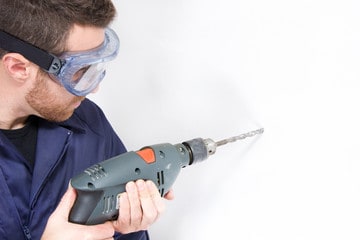Wood drill bits are essential tools for woodworking. Normally most of the wood drill bits are made with high-speed steel, cobalt, and some coatings such as TiN, and TiCN. These coatings are applied on the wood drill bits in order to improve their hardness and durability. A regular wood drill bit should have a 118-degree cutting angle every time.
Woods are two types. Softwood and hardwood are them. According to the types of wood, some drill bits have different geometries. Most wood drill bits can be resharpened easily. Normally, when you are drilling softwood, you can use a high RPM, and for hardwood, you should use a lower RPM.
When you choose a wood drill bit, you should consider the hole diameter, depth, type of wood, hole location and many more.
What are the Wood Drill Bits?
Wood drill bits are used for drilling holes in wood. They are designed to cut and remove material quickly and cleanly, leaving a smooth hole on the both softwood and hardwood. Wood drill bits are commonly used in carpentry, woodworking, and construction.
Wood drill bits are typically made from high-speed steel (HSS), carbon steel, or carbide. HSS bits are durable and can withstand high temperatures, making them suitable for a wide range of applications. Carbon steel bits are less expensive and are used for softer woods.
The cutting angle for the wood drill bits are varied with the hardness of the wood. The softwood cutting angle is 118 degrees while hardwood cutting angle is 135 degrees. The main parts of a wood drill bit include the shank, the body, and the point. The shank is the part that is inserted into the drill. The body is the long, cylindrical part that forms the majority of the bit. The point is the cutting end of the bit, which includes the cutting edges and the tip.
The suitable RPM (Revolutions Per Minute) for a wood drill bit depends on the size of the bit, drill bit material and hardness of the wood. Smaller bits typically require a higher RPM, while larger bits require a lower RPM. For example, a 1/4-inch bit may require an RPM of around 3000, while a 1-inch bit may require an RPM of around 750.
What are the 13 Types Of Wood Drill Bits?
These are the 13 Types of wood drill bits
01. Auger Drill Bit
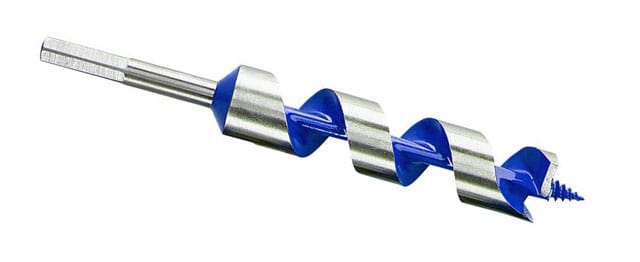
Auger drill bits are commonly used drill bits in wood drilling for boring holes in bulkheads and general timber applications. These are with long and clear flutes and the end is with a small screw that use to drill the drilling point without a pilot hole. These bits are designed to pull the bits inside the wood and that will not require more excess pressure on the person. Some auger bits are with the capability of drilling nails also.
According to the flute types, the auger drill bits are two types. Jenning type and Irwin types are them. Normally you can drill 1000 RPM until diameter is 10mm. Upto 20mm you can use 800 RPM and more than that you can use 400 RPM for drilling.
Advantages of auger drill bits.
- Drilling deep capability
- Drilling with neat and clean holes
- No chip clogging
- Wide drilling
- Can be used without pilot holes.
02. Spade Drill Bit
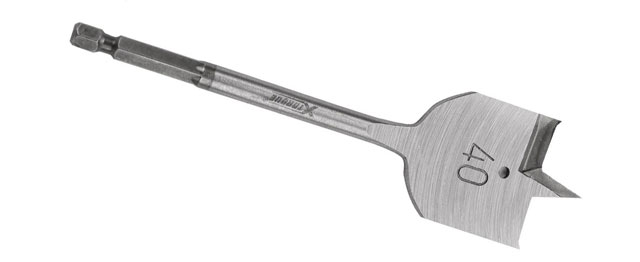
The spade drill bit has a sharp punching point hence you will not need to make a pilot hole. As well as some spade drill bits have a screw. Hence those are considered as self driven bits.
Spade drill bits are flat. There is a sharp point angle and cutting edge. The sharp spurs will produce a clean and neat hole surface. When you buy this, you should consider these factors. These are not able to drill deep due to clogging the chips.
- Spade drill bits are not with flutes
- Mostly used for wide-diameter drilling purposes
- Spade drill bits can be used for angle drilling easily
- Spade drill bits can be used for wood, plastic, and some plywood
- The real problem is not able to use the exact depth
03. Forstner Drill Bit
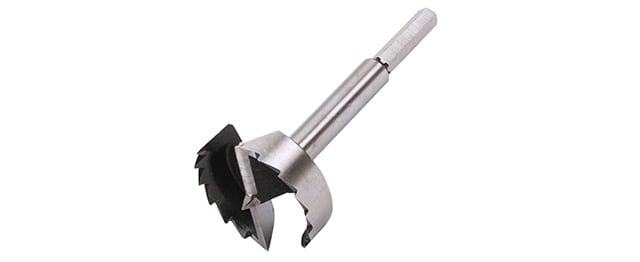
Forstner drill bits are used to drill clean and accurate flat bottom holes. When you need to drill a hole overlapping with another one, you can use this successfully. As well as you can drill the edge of the wood without damaging the edge. The center spur makes it easy to place the drill in the correct place.
According to the shape of the guide rim, Forstner drill bits are of three types. Those are saw tooth Forstner drill bit, continuous Forstner drill bit, and wavy Forstner drill bit. Among them, wavy Forstner drill bits are the best and most efficient for wood woodworking.
- Cutting edge makes clear hole surface
- It can use to drill 90 degrees, drill overlapping and angles drilling also.
- Use low RPM due to lot of friction and heat.
- Drilling can be done without a center due to the sawtooth edge.
04. Countersink Drill Bit
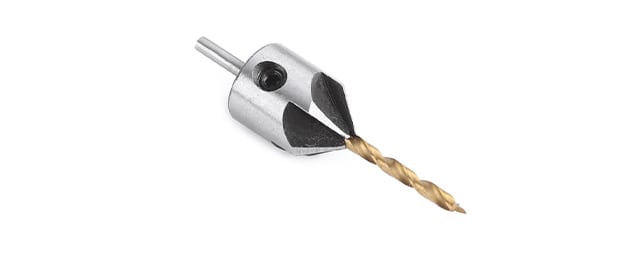
Counter sink drill bits are essential drill bits for screw fastening tasks. When we drive the screw inside the material, we can see the screw head is a bit outer of the material edge.
If you can remove those materials, you can penetrate the screw head inside the wood. So counter sink drill bit does a good job for this. And also, when we use screws on softwood edges, they can splinter due to the compression of the wood. You can manage such a situation using counter sink drill bits easily.
There are some countersink drill bits that can use together with the pilot drill bit
- Tapering the screw hole edge
- Not used for deep drilling
When you drill close to the wood workpiece edge, you should start with a pilot hole. Pilot hole can be drilled using this guide properly.
05. Installer Bit
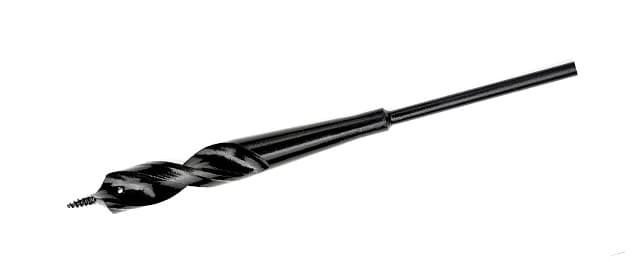
Installer bits are used to install wires or cables that are not able to move through the drilled hole. There is a small hole in the drill bit and you can connect that hole and drill bit. When you drill you have to stop the drilling without removing the drill bit.
- Then remove the drill from the tool.
- Connect the drill bit and wire using the hole
- Pull out the drill bit from the hole by hand
- The tightened wire or cable will come out easily.
06. Step Drill Bit
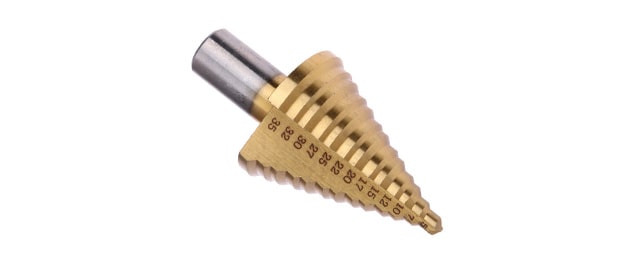
The step drill bit is a real solution for using multiple drill bits. Step drill bits are a combination of multiple drill bits. These are different diameters and different step heights. According to your preferences, you can drill until you get the correct diameter hole.
- Mostly used in steel drilling, but it can be used in wood also
- Can’t drill into too much depth
- The step height should be more than the wood thickness
07. Hole Saw
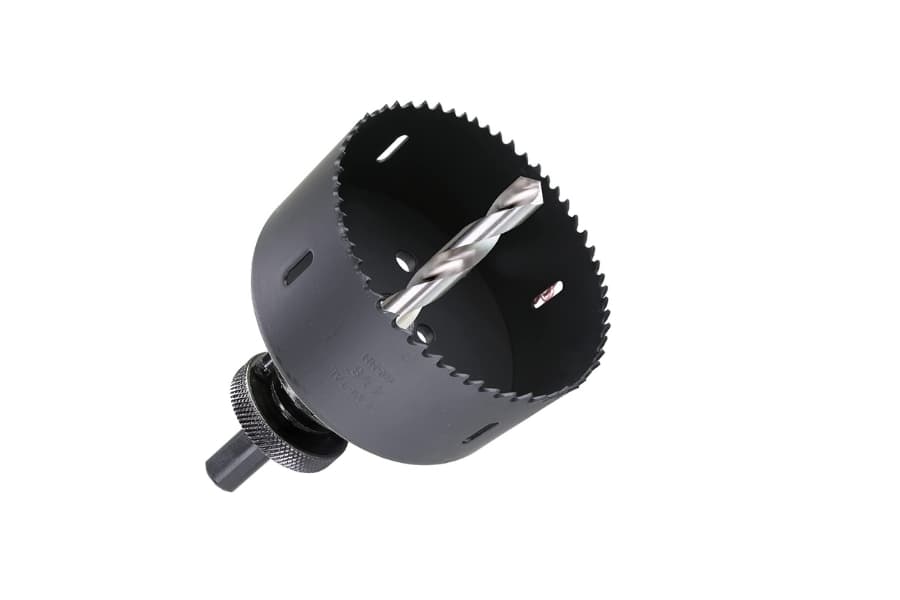
Actually, a hole saw is a cylindrical saw. That is used to drill exact depths. There is a sawtooth around the hole; hence it provides excellent finishing to the drilled hole. Some hole saws are with cutting nails or metal inside the woods.
- Hole saws are more friction drill bits
- Can be drilled exact depth
- Easy to make a point hole because the drill bit is inside.
08. Brad Point Drill Bit
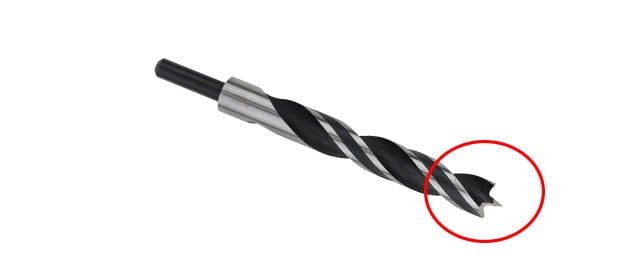
Brad point drill bits are used to drill mostly without a pilot hole. There is a mid-sharpen tip that can punch the wood and make the drill point easily, and there is a spur on both ends. This help to produce a clear and sharpened drill hole surface.
Brad point drill bits are two types according to its brad and lips positions. Sharp lips are in the hardwood brad point drill bit and curved cutting lips are on the softwood brad point drill bit.
Advantages of brad point drill bit
- Easy to drill on the exact drilling spot
- No need a pilot hole
- Clean cutting edge
09. Hinge Sinker Drill Bit
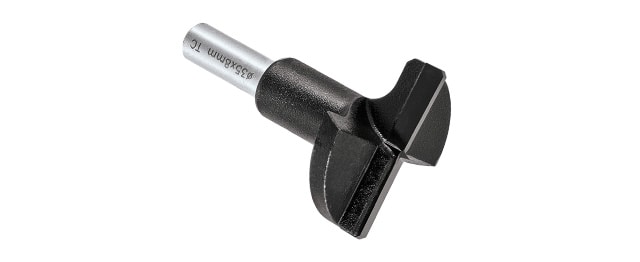
Hinge sinker drill bits are used for the kitchen furniture manufacturing process. Mainly this is used for the recessing circular hinges, door butts, door hinges and cabinets. These tools are used for the light woods.
It provides a clean and neat cutting hole. This is the same as the hole saw and is specially used for the furniture-making process.
10. Adjustable Drill Bit
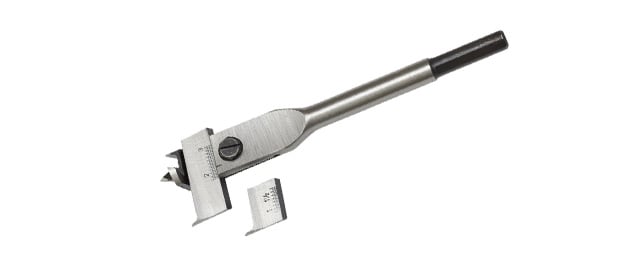
This is an amazing drill bit. You can adjust the drilled hole diameter by changing the spur of the drill bit. There is a screw and adjustable spur. Spur length can be adjusted according to the hole diameter.
- No flute
- Can be used in more depth
- No need a pilot hole
- Can drill overlapping holes.
11. Pocket Hole Drill Bit
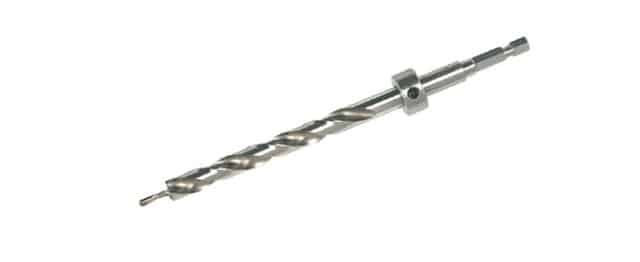
When you need to connect two blocks of wood with angular drilling, you should use the pocket hole drill bit. This is a combination of a small drill bit and a large drill bit. When connecting two angular screw heads may not fit properly. This can be reduced if you use this.
You can drill angular when you use this easily.
12. Pilot Point Drill Bit
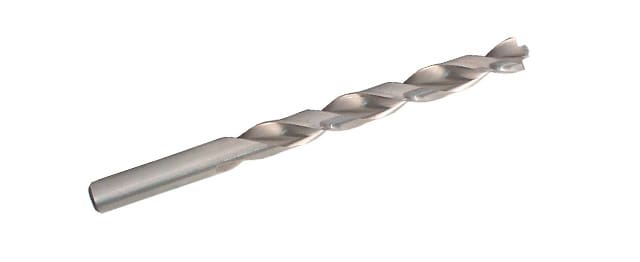
Pilot point drill bits are used instead of pilot drill bits. These are not like brad point drill bits. The result is the same as the multi-purpose drill bits. The only difference is the pilot hole-making process.
13. Multi-Point Drill Bit
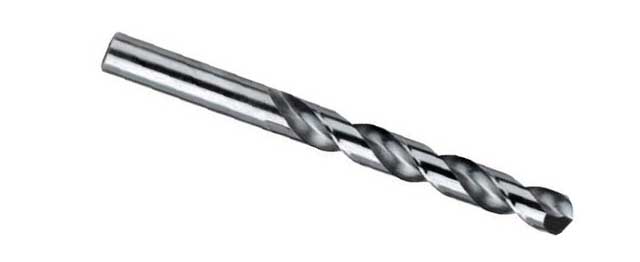
This is the common drill bit we use. There is a V shape end of the drill bit and it can be used from many kinds of wood and steel. Most regular drill bits are Multipurpose drill bits and there should be a proper cutting angle to use.
Otherwise, it will not cut and remove the material properly.
How to Select the Right Drill Bit For You?
When you select the right drill bit, you should know the hardness of the wood first. There are types of woods. As you are well aware, those are hardwood and softwood. Softwood can be drilled with high RPM and lower RPM should be used for the softwood.
Choose Right Drill Bit Material – When you select the right drill bit, you should consider the drill bit material. Most wood drill bits are made with HSS and some characteristics have been added by mixing cobalt, titanium etc. Adding these materials will make the drill bit harder. So pay attention to the drill bit material when you buy it.
Choose Right Drill Bit Geometry – Softwood will cut easily, and hardwood will not cut quickly. So for the softwood, you should have deeper flutes with high flute capacity, and for the hardwood, you can use deep flutes with low flute capacity. Because softwood can drill easily, and chips should be removed quickly from the hole, but hardwood doesn’t need this.
According to the geometry of the hole, you can choose which drillbit is suitable for your task. It depends on your project.

